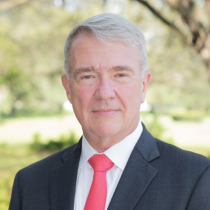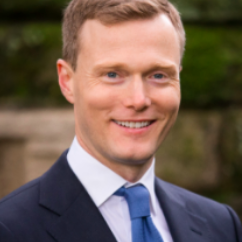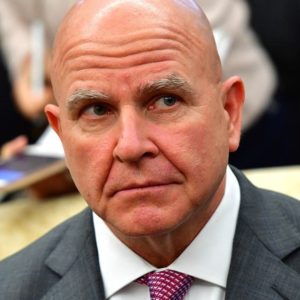Thucydides’ History of the Peloponnesian War
Discover what Thucydides can teach us about the permanent questions of political life.
June 22–June 28, 2025
Washington, DC
An examination of what it means to command at the very highest levels of war, focusing on the U.S. military experience from World War I until today. The course will use the case-study method to draw out lessons about the nature of command at the theater level, and how it has changed over the past 110 years.
The framing construct for the course will be the change in the U.S. military from a small constabulary force on the eve of the First World War to the establishment of the national security state and a large standing military following the end of the Second World War, and the long struggle with the Soviet Union that ensued. Against this backdrop, we will examine how senior military leaders dealt with operational, strategic, diplomatic, technological, and political issues.
Gen. McKenzie on Afghanistan, Iran, & China
This course is part of our residential Security Studies Program. Fellows participate in morning seminars and meet national security leaders and experts over afternoon and evening sessions. Up to 16 fellows will be selected.

Gen. Kenneth ‘Frank’ McKenzie Jr. is the former Commander of United States Central Command. He led a distinguished 42-year military career, commanding at multiple levels within the Marine Corps and serving on the Joint Staff. His leadership roles included commanding the First Battalion, Sixth Marines, and the 22nd MEU (SOC) during combat deployments to Afghanistan and Iraq.

Gen. Kenneth ‘Frank’ McKenzie Jr. is the former Commander of United States Central Command. He led a distinguished 42-year military career, commanding at multiple levels within the Marine Corps and serving on the Joint Staff. His leadership roles included commanding the First Battalion, Sixth Marines, and the 22nd MEU (SOC) during combat deployments to Afghanistan and Iraq. As a Brigadier General, he contributed to wartime administration transitions and later helped shape strategic policies for the U.S. Central Command and the Marine Corps. Promoted to General in 2019, McKenzie took command of CENTCOM, a role he held until his retirement from the Marine Corps in April 2022.
General McKenzie currently serves as the Executive Director of the University of South Florida’s Global and National Security Institute and Executive Director of the Florida Center for Cybersecurity, also known as Cyber Florida.
Readings:
Discussion Questions:
Readings:
Discussion Questions:
Readings:
Discussion Questions:
Readings:
Discussion Questions:
Readings:
Discussion Questions:

Hugh Liebert
Mike Gallagher
Mike Gallagher served for four terms in the U.S. House of Representatives as Wisconsin’s 8th Congressional District representative. Previously, he served seven years on active duty in the U.S. Marine Corps, including two deployments to Iraq.
Aaron MacLean
Aaron MacLean is a senior fellow at Hudson Institute and the host of the School of War podcast. Previously, he was senior foreign policy advisor and legislative director to Senator Tom Cotton of Arkansas. Aaron served on active duty as a U.S. Marine for seven years, deploying to Afghanistan as an infantry officer in 2009–2010.

Daniel Blumenthal
Dan Blumenthal is a senior fellow at the American Enterprise Institute, where he focuses on East Asian security issues and Sino-American relations. Mr. Blumenthal has served in and advised the US government on China issues for more than a decade.

Christian Brose
Christian Brose is a Senior Fellow at the Carnegie Endowment for International Peace and the Head of Strategy at Anduril Industries, prior to which he served as staff director of the Senate Armed Services Committee. He was also responsible for leading the production, negotiation, and passage of four National Defense Authorization Acts, which set policy and authorized spending for all U.S. national defense activities.

Matthew Kroenig
Matthew Kroenig is a Professor in the Department of Government and the Edmund A. Walsh School of Foreign Service at Georgetown University. A 2019 study in Perspectives on Politics ranked him as one of the top 25 most-cited political scientists of his generation. He has served in several positions in the U.S. Department of Defense and the intelligence community in the Bush and Obama administrations.

H.R. McMaster
H. R. McMaster is the Fouad and Michelle Ajami Senior Fellow at the Hoover Institution, Stanford University. Previously, he served as the 26th assistant to the president for National Security Affairs and as a commissioned officer in the United States Army for 34 years before retiring as a Lieutenant General. He is author of Battlegrounds: The Fight to Defend the Free World.

Vance Serchuk
Vance Serchuk is Executive Director of the KKR Global Institute and an Adjunct Senior Fellow at the Center for a New American Security. Prior to joining KKR, Mr. Serchuk served for six years as the senior national security advisor to Senator Joseph Lieberman (I-Connecticut).

Shilo Brooks
Shilo Brooks is Executive Director of the James Madison Program in American Ideals and Institutions and Lecturer in the Department of Politics. He is author of Nietzsche’s Culture War, in addition to scholarly and journalistic articles on a variety of topics in politics and the humanities. His teaching and research interests lie in the history of political philosophy, politics and literature, and statesmanship.

Jenna Silber Storey
Jenna Silber Storey is a senior fellow in the Social, Cultural, and Constitutional Studies department at the American Enterprise Institute (AEI), and co-director of AEI’s Center for the Future of the American University. She is concurrently an SNF Agora Fellow at Johns Hopkins University, and a research fellow at the Civitas Institute at the University of Texas at Austin. She also serves on the executive committee of the Alliance for Civics in the Academy.